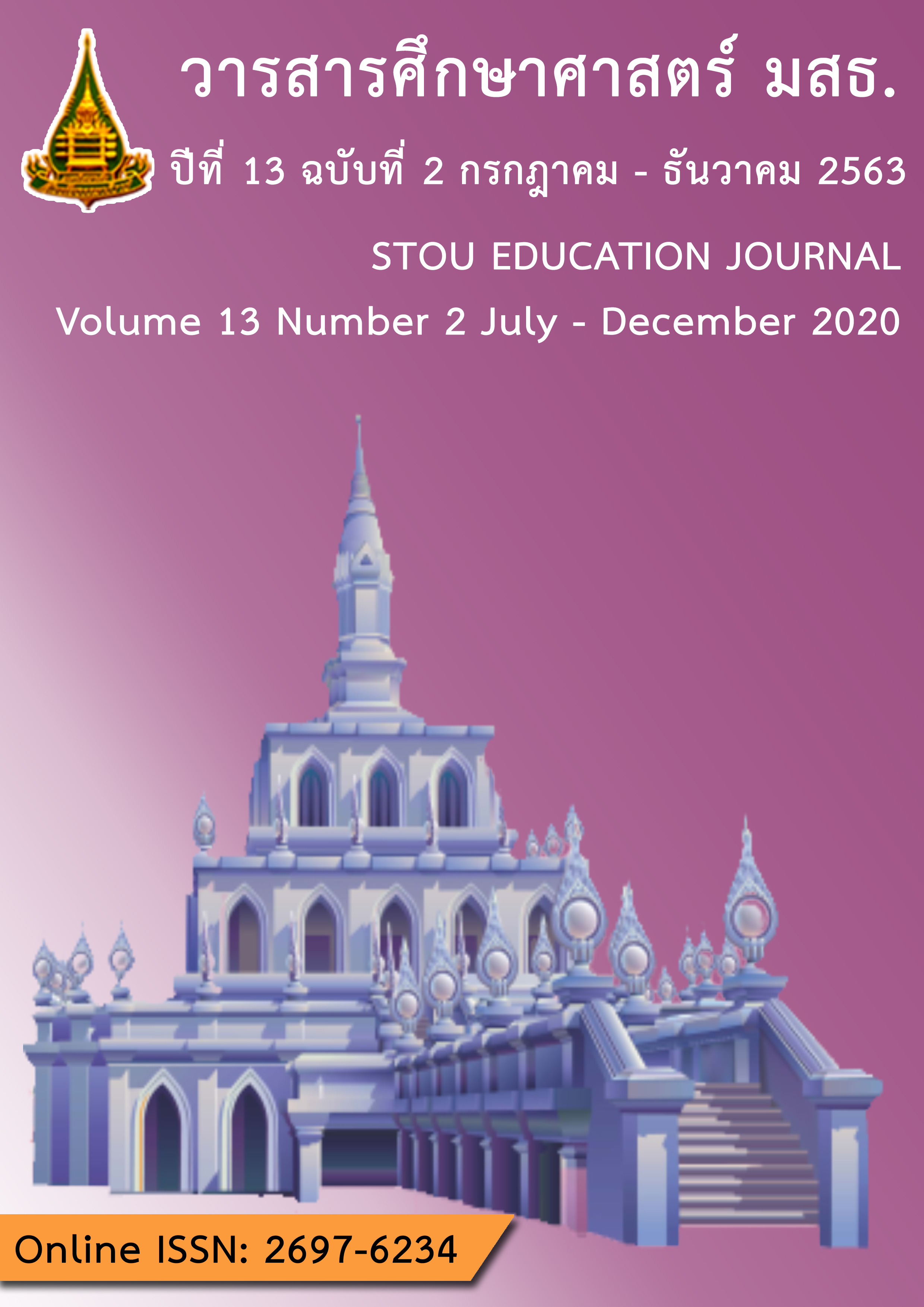A Study of Research Direction in School of Educational Studies, Sukhothai Thammathirat Open University
Main Article Content
Abstract
The objectives of this research were to study the needs for conducting research, opinions of experts concerning direction of research and the research direction of the School of Educational Studies. The research process comprised two stages. The first stage was the study of the needs. The research sample consisted of 44 lecturers of the School of Educational Studies. The employed data collecting instrument was a dual-format rating scale questionnaire dealing with the actual state and the expected state. Data were analyzed using the percentage, mean, standard deviation, PNImodified, and content analysis. The second stage was the study of research direction using a focus group discussion involving five experts and the conducting of public hearing involving lecturers of the School of Educational Studies. The research instruments were a form containing guidelines for focus group discussion and a form containing issues for public hearing. The data were analyzed with content analysis. The research findings were as follows: 1) The need with the highest priority was that for conducting research study on issues affecting the economy, issues affecting community and social development, distance education management, and the university’s policy for educational development, respectively. 2) Results of the study of the experts’ opinions concerning research direction, it was found that the experts agreed with the proposed direction. They suggested additional research issues in all areas and provided the following recommendations: the research studies of the School should be local area-based, the research that integrate education with other disciplines, and the research that aim to develop the potential of people in a sustainable way using distance education as the core of development with consideration of the implementation of the sufficiency economy philosophy. All lecturers agreed with the research direction. 3) The research direction should cover two main areas: (1) the development of instructional quality which consists of the university’s policy, and research study on the university’s distance education management; and (2) the economic, community and social development which consists of the research studies having impact on the economic development, and community and social development.
Article Details
References
บุญชม ศรีสะอาด. (2545). การวิจัยเบื้องต้น (พิมพ์ครั้งที่ 7). กรุงเทพฯ: สุรีวิยาสาส์น.
มหาวิทยาลัยสุโขทัยธรรมาธิราช.(2557). แผนยุทธศาสตร์มหาวิทยาลัยสุโขทัยธรรมาธิราช ระยะ 5 ปี. กองแผนงาน นนทบุรี: โรงพิมพ์มหาวิทยาลัยสุโขทัยธรรมาธิราช.
สภาวิจัยแห่งชาติ.(2560). นโยบายและยุทธศาสตร์การวิจัยของชาติ ฉบับที่ 9 (พ.ศ. 2560-2564). สืบค้นจาก https://www.nrms.go.th/FileUpload/AttatchFile/News/255908041558422182432.pdf.
สุวิมล ว่องวาณิช. (2550). การวิจัยประเมินความต้องการจำเป็น. กรุงเทพฯ: สำนักพิมพ์แห่งจุฬาลงกรณ์มหาวิทยาลัย.
สำนักงานคณะกรรมการวิจัยแห่งชาติ.(2562). นโยบายยุทธศาสตร์องค์กร. สืบค้นจาก http://www2.Nrct.go.th/e-publish1/policystrategy60-64/files/downloads/nrct_policy-strategy60-64upd591011.pdf
อวยพร เรืองตระกูล, ภิรดี วัชรสินธุ์ และอรอุมา เจริญสุข (2553). การสังเคราะห์แนวโน้ม ทิศทาง และประเด็นการวิจัยของคณะครุศาสตร์/ศึกษาศาสตร์ ในช่วงปี พ.ศ.2550-2554. กรุงเทพมหานคร: สำนักงานคณะกรรมการวิจัยแห่งชาติ.
Krejcie R. V. & Morgan E. W. (1970). Determinig sample size for research activities. Educational and Psychological Measurement, 30(3), 607-610.


